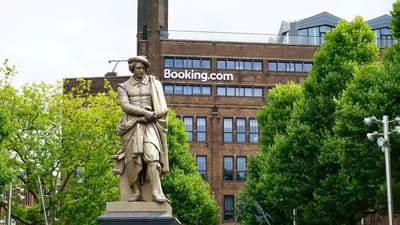The Impact of Booking System Speed on Conversion Rates
In today's fast-paced digital world, the speed of a booking system can make or break a business's success. This article delves into the crucial relationship between system performance and booking completions, exploring how even minor delays can significantly impact conversion rates. We'll examine the psychology behind user expectations for quick interactions and the potential revenue loss associated with slow-loading booking pages. Furthermore, we'll provide actionable techniques for optimizing load times, reducing lag, and creating a seamless booking experience that not only meets but exceeds user expectations. By understanding and implementing these strategies, businesses can enhance their booking system's performance and ultimately boost their conversion rates.Table of Contents:
-
The Significance of Booking System Speed
- The Psychology of User Expectations
- Measuring and Benchmarking System Performance
- Optimizing Backend Performance
- Frontend Optimization Techniques
- Mobile Optimization for Booking Systems
- Streamlining the Booking Process
- Continuous Monitoring and Improvement
- The Psychology of User Expectations
- Measuring and Benchmarking System Performance
- Optimizing Backend Performance
- Frontend Optimization Techniques
- Mobile Optimization for Booking Systems
- Streamlining the Booking Process
- Continuous Monitoring and Improvement

The Significance of Booking System Speed
In the digital age, speed is king. Users have come to expect lightning-fast interactions with websites and applications, and booking systems are no exception. The speed at which a booking system operates can significantly influence a user's decision to complete a transaction or abandon it altogether. Studies have shown that even a one-second delay in page load time can result in a 7% reduction in conversions. For businesses relying on online bookings, this can translate to substantial revenue losses.Moreover, a slow booking system can negatively impact user experience, leading to frustration and potentially damaging brand reputation. In contrast, a swift and responsive booking process can enhance user satisfaction, encourage repeat bookings, and foster positive word-of-mouth recommendations.
Do you need a website? Want to build a website but don't know where to start? Our website builder is the perfect solution. Easy to use, and with the ability to customize to fit your business needs, you can have a professional website in no time.
The Psychology of User Expectations
Understanding the psychology behind user expectations is crucial when optimizing booking system speed. Users have become accustomed to near-instantaneous responses in their digital interactions, and this expectation carries over to booking processes. When faced with a slow or laggy system, users may perceive it as unreliable or outdated, leading to a lack of trust in the service.Furthermore, the concept of 'cognitive load' comes into play. A slow booking system requires users to maintain their focus and intention for longer periods, increasing the likelihood of distractions or second thoughts about the booking. By providing a swift and seamless experience, businesses can reduce cognitive load, maintain user engagement, and increase the probability of successful conversions.
Measuring and Benchmarking System Performance
To improve booking system speed, it's essential to first establish a baseline and set performance benchmarks. Key metrics to monitor include page load time, time to first byte (TTFB), and overall transaction completion time. Tools like Google PageSpeed Insights, GTmetrix, and WebPageTest can provide valuable insights into your system's performance.Industry standards suggest that an ideal page load time should be under 3 seconds, with the booking process itself taking no more than a few additional seconds to complete. However, it's important to note that user expectations may vary depending on the complexity of the booking and the industry you're operating in. Regularly testing and comparing your system's performance against competitors can help you stay ahead in the fast-paced digital landscape.
Building a website with SITE123 is easy
Optimizing Backend Performance
A significant portion of booking system speed relies on backend performance. Optimizing server response times, database queries, and API calls can dramatically improve overall system speed. Consider implementing caching mechanisms to store frequently accessed data and reduce the load on your servers. Additionally, optimizing database indexes and query structures can lead to faster data retrieval and processing.Another crucial aspect is the efficient handling of concurrent users. Implementing load balancing and scaling solutions can ensure that your booking system maintains its speed even during peak traffic periods. Regular code audits and performance profiling can help identify bottlenecks and areas for improvement in your backend infrastructure.
Frontend Optimization Techniques
While backend optimizations are crucial, frontend performance plays an equally important role in creating a swift booking experience. Minimizing HTTP requests, compressing images and assets, and leveraging browser caching can significantly reduce page load times. Implementing lazy loading for images and content that's not immediately visible can also improve initial page load speed.Moreover, optimizing JavaScript and CSS can lead to faster rendering and interaction times. Consider using modern web technologies like progressive web apps (PWAs) or single-page applications (SPAs) to create a more responsive and app-like booking experience. These technologies can provide near-instantaneous page transitions and reduce the perceived load time for users.
Mobile Optimization for Booking Systems
With an increasing number of users making bookings on mobile devices, optimizing for mobile performance is no longer optional. Mobile users often face additional challenges such as slower network connections and less powerful devices. Implementing a responsive design that adapts to different screen sizes and optimizing for touch interactions can greatly enhance the mobile booking experience.Consider developing a mobile-first approach, where the booking system is designed primarily for mobile devices and then scaled up for desktop users. This approach ensures that the core functionality and speed are optimized for the most challenging use case. Additionally, implementing Accelerated Mobile Pages (AMP) can provide an ultra-fast loading experience for mobile users, potentially increasing conversion rates on these devices.
Streamlining the Booking Process
Beyond technical optimizations, streamlining the booking process itself can lead to perceived speed improvements and higher conversion rates. Minimize the number of steps required to complete a booking, and consider implementing a progress indicator to keep users informed and engaged throughout the process. Autofill capabilities and smart defaults can reduce user input time and effort.Another effective strategy is to implement a guest checkout option, allowing users to complete their booking without the need for account creation. This can significantly reduce friction in the booking process, especially for first-time users. However, it's important to balance this with the benefits of user accounts, such as faster repeat bookings and personalized experiences.
Continuous Monitoring and Improvement
Optimizing booking system speed is not a one-time task but an ongoing process. Implement real-time monitoring solutions to track system performance and identify issues as they arise. Regular A/B testing of different optimizations can help you understand which changes have the most significant impact on conversion rates.User feedback is also invaluable in this process. Encourage users to provide feedback on their booking experience and pay close attention to any complaints about system speed or responsiveness. By continuously iterating and improving based on performance data and user feedback, you can ensure that your booking system remains competitive and continues to meet evolving user expectations.





